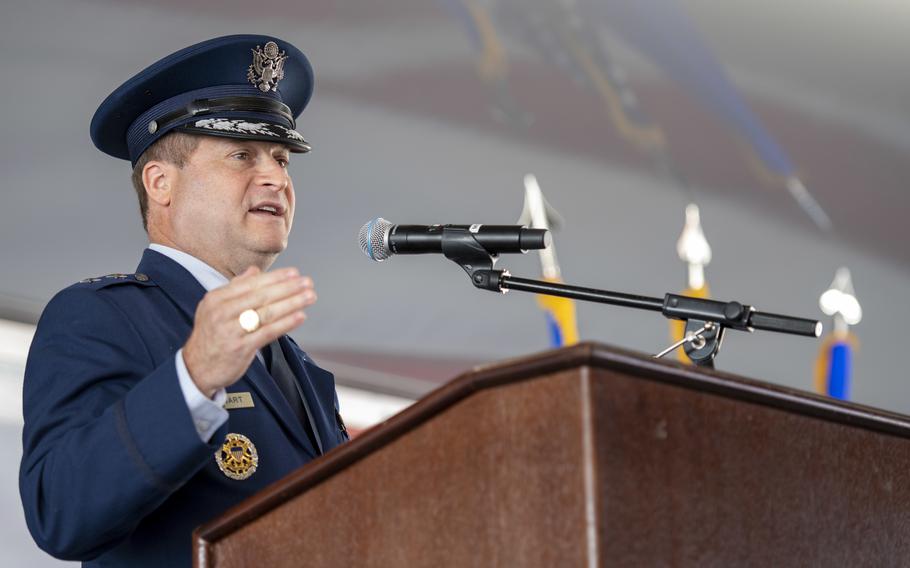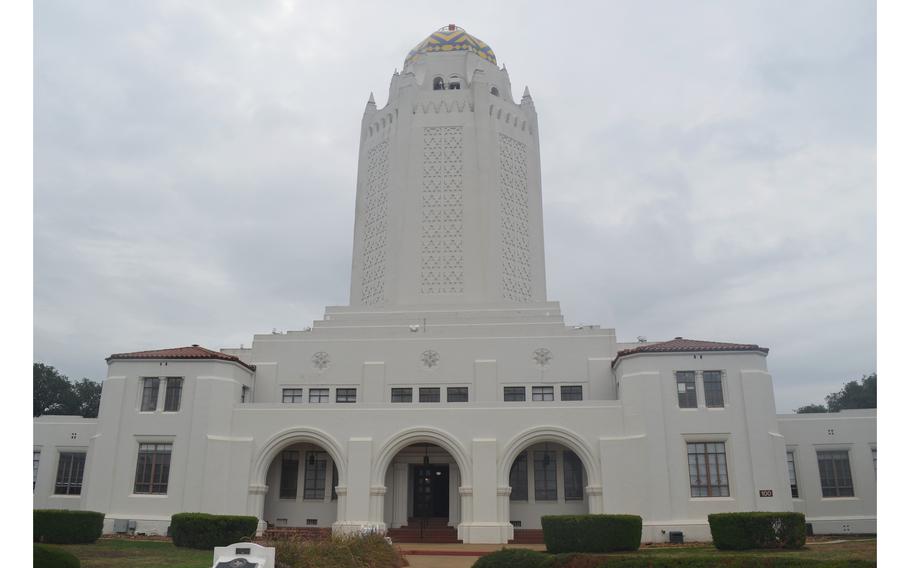
Air Force Maj. Gen. Phillip Stewart, 19th Air Force commander, speaks during a change-of-command ceremony Aug. 19, 2022, at Joint Base San Antonio-Randolph Air Force Base, Texas. (Jonathan Mallard/U.S. Air Force)
RANDOLPH AIR FORCE BASE, Texas — Lawyers argued during a hearing Tuesday whether the evidence used to charge Maj. Gen. Phillip Stewart with sexual assault points to a commander abusing his power over a junior officer or a woman regretting an alcohol-fueled night of infidelity with her boss.
With 24 items of evidence to review, Col. Brian Thompson, a military judge serving as the hearing’s presiding officer, will have until mid-November to recommend whether there is probable cause to court-martial Stewart. The charges against Stewart are dereliction of duty, sexual assault, behavior unbecoming of an officer and adultery.
Lt. Gen. Brian S. Robinson, the commander of the Air Education and Training Command, will use Thompson’s report to determine whether Stewart will go to trial. Robinson in May fired Stewart from his post as commander of the 19th Air Force because of the allegations.
Witnesses were not questioned during the roughly one-hour hearing at Joint Base San Antonio-Randolph Air Force Base, Texas, where Stewart led the Air Force’s major pilot training unit. Stewart’s face showed little emotion as he sat among his two military and three civilian attorneys in Building 100, a historic multi-use office building at Randolph that is known commonly as “The Taj Mahal.”

An Article 32 preliminary hearing for charges against Air Force Maj. Gen. Phillip Stewart was held Tuesday, Oct. 24, 2023, in Building 100, which is known as the Taj Mahal, at Joint Base San Antonio-Randolph Air Force Base in Texas. Stewart is charged with sexual assault, among other charges. (Rose L. Thayer/Stars and Stripes)
Most of Tuesday’s hearing focused on the two-count sexual assault charge against Stewart, which alleges he had sex with an officer under his command twice without her consent April 14 at Altus Air Force Base in Oklahoma.
On that night, Stewart, the victim and two additional military personnel were drinking alcoholic beverages together, according to evidence discussed during the hearing. Sometime after leaving the gathering, a technical sergeant sent a text message to the victim asking if everything was OK. The victim responded yes.
Once alone, the victim sat closely on a couch next to Stewart and began to show him non-sex-related photos. She told criminal investigators that he kissed her, and she kissed him back. Then the two moved into a bedroom, where he undressed her and then himself, according to evidence discussed at the hearing.
Later April 14, Stewart participated in a training flight and sent a photo of himself in the aircraft to the victim. The flight occurred within 12 hours of drinking alcoholic beverages, which is not permitted.
Keith Scherer, a civilian defense attorney for Stewart, argued the victim’s interview with the Air Force Office of Special Investigations proves “it is guilt and shame” that led to the charges rather than nonconsensual sex. He accused investigators of an “unwillingness” to consider anything other than sexual assault during the victim’s interview with them.
“I told him I’ve never been unfaithful to [my husband],” Scherer quoted from the woman’s interview.
A video of the interview was included as evidence and discussed but not played during the hearing. She never explicitly told Stewart to stop or tried to get out of the situation, the lawyer said.
“Anybody who’s watched that video, it’s hard to believe they would want to go forward with a [sexual-assault charge], Scherer said.
Thompson told prosecutors he too was having trouble finding probable cause in the woman’s interview and asked them to explain at what point it became clear to them the sex was not consensual.
“It’s important for whoever makes this decision … to seriously consider the responsibilities and duties of an Air Force major general behaving in this manner with [a subordinate],” said Lt. Col. Pete Havern, one of three prosecutors at the hearing.
Instead of explicitly saying no, Havern said the victim described to investigators “social cues” to try to “politely discourage” the senior officer from initiating sex. The victim told investigators that alcohol consumption delayed her responses, the lawyer said.
Havern also quoted to Thompson that the military’s definition of sexual assault states a lack of physical and verbal resistance doesn’t constitute consent.
Looking at text messages between the two dating to Sept. 6, 2022, Havern said it’s clear that Stewart had an interest in the victim that went beyond a professional relationship, and it was one-sided.
“She calls him boss in that interview. Abuse of authority and rank differential permeates the entire case,” Havern said.
Stewart is also accused of flying a training aircraft at Altus during that same visit within 12 hours of drinking alcoholic beverages, according to his charge sheet. The judge asked prosecutors to submit further evidence to prove Stewart was in control of the aircraft during the more than four-hour flight.
Thompson also questioned whether there was precedent to take this type of flight violation to court-martial rather than handling it through administrative action. The prosecution did not offer any but said the flight happened at the same time as the other charges and fits into the context of the other events.
“The government strongly believes it’s necessary to tell the full story of the events of that night,” Havern said.
Once Robinson receives Thompson’s recommendation, there is no timeline for him to decide whether to move forward with a court-martial, according to the Air Education Training Command.
If Stewart were to face a court-martial, he would be only the second general officer in the service’s history to do so, according to the Air Force. Maj. Gen. William Cooley was convicted of abusive sexual contact in a court-martial last year at Wright-Patterson Air Force Base in Ohio. He was sentenced to a reprimand and a forfeiture of nearly $55,000.
Stewart, who began his career as a fighter pilot, took command of the 19th Air Force in August 2022, according to his online biography. Prior to the assignment, he served as deputy chief of staff for strategic employment at Supreme Headquarters Allied Powers Europe in Belgium. He deployed to Afghanistan in 2017.
The 19th Air Force includes 32,000 personnel and 1,530 aircraft assigned to 17 wings located across the United States. It oversees more than 45% of the Air Force’s annual flying hour program, according to Stewart’s biography.